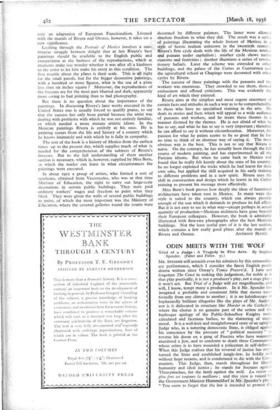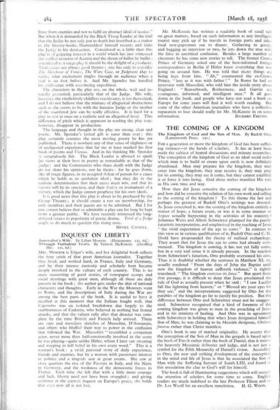ODIN MEETS WITH THE WOLF MR. SPENDER will astonish even
his admirers by this extraordin- ary performance, which I consider the finest English poetic drama written since Otway's Venice Presertz'oi. I hive not forgotten The Cenci in making this judgement, for noble as is that play poetically, it is not a producer's play, not a -stage play ; it won't act. But Trial of a Judge will act magnificently, and will, I know, tempt many a producer. In it Mr. Spender has imagined a probable and consistent fable that moves - sure- footedly from one climax to another ; it is na kaleidoscope of haphazardly brilliant allegories like the plays of Mr. Auden ; nor is it dislocated in structure like Murder in the Cathedral, where the chorus is no genuine part of the action and the burlesque apology of the Public-Schoolboy Knights make calculated and facetious bathos, to the shattering of tragic mood. It is a well-knit and straightforward story of an upright Judge who, in a tottering democratic State, is obliged against his conscience by the pressure of " political necessity " to reverse his doom on a gang of Fascists who have wantonly murdered a Jew, and to condemn to death three Communists whose crime is to have wounded a policeman in self-defence. When this Judge realises that his reversal of justice has over- turned the State and established jungle-law, he boldly and without hope recants, and is condemned to die with the Com- munists. This Judge, then, stands throughout for liberal humanity and ideal justice ; he stands for Socrates against Thrasymachus, for the lamb against the wolf. La raison du plus fort est toujours la meilleure : and this view is voiced by the Government Minister nimmeldari jtt MiSpender's play " You seem to forget that the law is intended to protect the
State from enemies and not to fulfil an abstract ideal of justice." But when it is demanded by the Black Troop Leader at the trial that the Judge be not only put to death but inscribed as a traitor in the history-books, Hummeldorf himself recants and joins the Judge in his destruction. Considered as a fable then this play is of gripping interest in a world which has just witnessed the wolfish invasion of Austria and the threat of ballot by bullet : considered as a stage-play it should be the delight of a producer. Trial-seenes are always good theatre ; one has only to consider The Merchant of Venice, The Ware Case, or Judgment Day to realise what excitement tingles through an audience when a trial is on foot before it. And Mr. Spender has handled his trial-scene with convincing expedition.
The characters in the play are, on the whole, well and in- wardly presented, particularly that of the Judge. His wife, however, the vindictively childless reactionary, is too theoretical, and I do not believe that the mixture of allegorical abstractions such as she seems to be With the humane Judge or the mother of the murdered Jew can be really effective. It is hard for a play to rest at once on a realistic and an allegorical level. This difference of pitch which is apparent in reading the play may, however, disappear in production.
The language and thought in the play are strong, clear and poetic. Mr. Spender's lyrical gift is surer than ever ; this play certainly contains the most moving poetry he has yet published. There is nowhere any of that sense of slightness or of undigested experience that for me at least marked his first book of poems and Vienna. And in his thinking Mr. Spender is scrupulously fair. The Black Leader is allowed to speak his views at their best in poetry as remarkable as that of the judge ; and the Communists who share death with the Judge do not share his opinions, nor he theirs : for he goes down, like all tragic figures, in an accepted defeat of person for a cause which he holds as an unshaken ideal ; but they die in the realistic determination that their cause must win, and that its victory will be its sanction, and their deaths an instrument of a victory, which the Judge cannot prophesy for his own ideals.
It is good news that this play is about to be produced by the Group Theatre ; it should create a run on membership, for only members and their guests are to be admitted. But I for one cannot believe that so admirable a play can for long be kept from a greater public. We have recently witnessed the long- delayed return to popularity of poetic drama. Trial of a Judge ought to do much to quicken this rising taste.
NEVILL COGHILL.















































 Previous page
Previous page